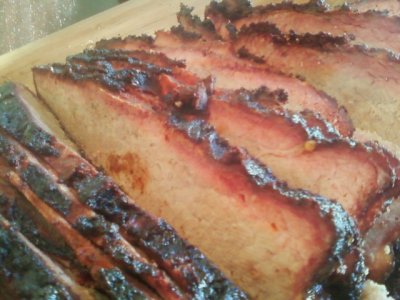RockyMtnBBQ
Found some matches.
So I did my first brisket today on my UDS. Overall, I was very happy with the results. It was tender and flavorful, but it just wasn't as juicy as I was expecting. The ends (esp. in the flat) were a little dry. I figured maybe you guys could give me some advice. I'll try to list as many details as possible.
-Brisket was 11 pound packer from Wal-Mart...no grade was listed on the package
-trimmed some fat off but left a little over 1/4"
-rubbed with yellow mustard and the beef rub off of www.amazingribs.com
-injected with half apple juice, half beer, and some rub
-put on smoker with hickory/pecan chunks at 9pm last night
-Fat side down
-temperature pretty stable between 220-230 although it was a little low (175) when I woke up this morning...I made some adjustments and got it back up to temp
-I did not open the lid at all until about 11 hours in...I had no thermometer so I had to go by how easily a metal skewer went into it. By 15 hours it slid into both the point and flat very easily.
-I pulled and foiled...rested in cooler for one hour and then sliced.
Thanks for the help in advance!
-Brisket was 11 pound packer from Wal-Mart...no grade was listed on the package
-trimmed some fat off but left a little over 1/4"
-rubbed with yellow mustard and the beef rub off of www.amazingribs.com
-injected with half apple juice, half beer, and some rub
-put on smoker with hickory/pecan chunks at 9pm last night
-Fat side down
-temperature pretty stable between 220-230 although it was a little low (175) when I woke up this morning...I made some adjustments and got it back up to temp
-I did not open the lid at all until about 11 hours in...I had no thermometer so I had to go by how easily a metal skewer went into it. By 15 hours it slid into both the point and flat very easily.
-I pulled and foiled...rested in cooler for one hour and then sliced.
Thanks for the help in advance!


